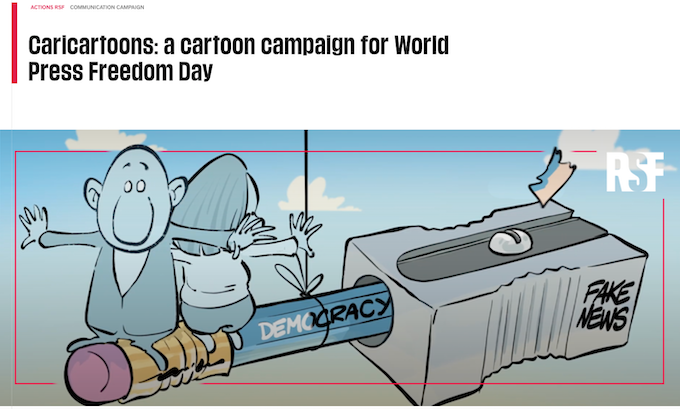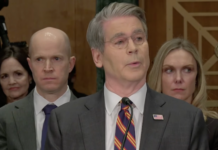
Australia (ranked 29th) and New Zealand (ranked 16th) are cited as positive examples by Reporters Without Borders in the 2025 World Press Freedom Index of commitment to public media development aid, showing support through regional media development such as in the Pacific Islands.
The 2025 World Press Freedom Index by Reporters Without Borders (RSF) has revealed the dire state of the news economy and how it severely threatens newsrooms’ editorial independence and media pluralism.
In light of this alarming situation, RSF has called on public authorities, private actors and regional institutions to commit to a “New Deal for Journalism” by following 11 key recommendations.
The media’s economic fragility has emerged as one of the foremost threats to press freedom.
- READ MORE: Rabuka salutes Fiji media but warns against taking freedom for granted
- NZ fares well in latest RSF press freedom index as authoritarian regimes stifle Asia-Pacific media
- RSF 2025 World Press Freedom rankings
- RSF World Press Freedom Index 2025: economic fragility a leading threat to press freedom
According to the findings of the 2025 World Press Freedom Index, the overall conditions for practising journalism are poor (categorised as “difficult” or “very serious”) in half of the world’s countries.
When looking at the economic conditions alone, that figure becomes three-quarters.
Concrete commitments are urgently needed to preserve press freedom, uphold the right to reliable information, and lift the media out of the destructive economic spiral endangering their independence and survival.
That is where a New Deal for Journalism comes in.
The 11 RSF recommendations for a New Deal for Journalism:
1. Protect media pluralism through economic regulation
Media outlets are not like other businesses and journalism does not provide services like other industries.
Although most news outlets are private entities, they serve the public interest by ensuring citizens’ access to reliable information, a fundamental pillar of democracy.
Media pluralism must therefore be guaranteed, both at market level and by ensuring individual newsrooms reflect a variety of ideas and viewpoints, regardless of who owns them.
In France (25th), debates around media ownership consolidation — particularly involving the Bolloré Group — have highlighted the risks to media pluralism.
In South Africa (27th), the Competition Commission is considering solutions to mitigate the threats posed by giant online platforms to the pluralism of the digital information space.
RSF 2025 World Press Freedom Index summary. Video: RSF
2. Adopt the JTI as a common standard
News outlets, tech giants, and governments should embrace the Journalism Trust Initiative (JTI), an international standard for journalism.
More than 2000 media outlets in 119 countries are already engaged in the JTI certification process. Launched by RSF, the JTI acts as a common professional reference that does not judge an outlet’s content but evaluates the processes in its production of information, improving transparency around media ownership and editorial procedures, and promoting trustworthy outlets.
This certification provides a foundation to guide public funding, inform indexing and ranking policies, and enable online platforms and search engines to highlight reliable information while protecting themselves against disinformation campaigns.
3. Establish advertisers’ democratic responsibility
Governments should introduce the principle that companies have a responsibility to help uphold democracy, similar to corporate social responsibility (CSR). Advertisers should be the first to adopt this concept as a priority, as their decision to shift their budgets to online platforms — or, worse, websites that fuel disinformation — makes them partially responsible for the economic decline of journalism.
Advertisers should be encouraged to link their advertising investments to criteria on reliability and journalistic ethics. Aligning advertising strategies with the public interest is vital for fostering a healthy media ecosystem and maintaining democracies.
This notion of a democratic responsibility for companies has notably been promoted by the steering committee of the French General Assembly of Information (États généraux de l’information) and may be included in the bill that will be examined in 2025 by the French National Assembly.
4. Regulate the gatekeepers of online information
Democratic states must require digital platforms to ensure that reliable sources of information are visible to the public and remunerated.
The European Union’s Copyright Directive and Australia’s (29th) News Media Bargaining Code in — the first legislation regulating Google and Facebook — are two examples of legally requiring major platforms to pay for online journalistic content.
Canada (ranked 21st) has undertaken similar reforms but has faced strong resistance, particularly from Meta, which has retaliated by removing news content from its platforms.
To ensure the economic value generated by online journalistic content is fairly distributed, these types of laws must be broadly adopted and their effective implementation must be guaranteed.
Public authorities must also ensure fair negotiations so that media outlets are not crushed by the current imbalance of power between economically fragile news companies and global tech giants.
Lastly, the rise of artificial intelligence (AI) has made the need for fair remuneration for content creators all the more urgent, as their work is now used to train or feed AI models. This is simply the latest example of why regulation is necessary to protect journalistic content from new forms of technological exploitation.

5. Introduce a tax on tech giants to fund quality information
The goal of introducing such a tax should be to redistribute all or part of the revenue unfairly captured by digital giants to the detriment of the media. The proceeds would be redirected to news media outlets and would finance the production of reliable information.
Several countries have already committed to reforms that tax major digital platforms, but almost none are specifically aimed at supporting the production of quality information from independent sources.
Indonesia (127th) implemented a tax on foreign digital services, while also requiring platforms to remunerate media outlets for the use of their content starting in 2024. France also established a specific tax on digital companies’ revenues in 2019.
6. Use public development aid to combat news deserts and strengthen reliable information from independent sources
As crises, conflicts and authoritarian regimes multiply, supporting reliable information from independent sources and countering emerging news deserts has never been more important.
Official Development Assistance (ODA) must incorporate support for independent journalism, recognising that it is indispensable not only for economic development but also for strengthening democratic governance and promoting peace.
At least 1 percent of ODA should be allocated to financing independent media outlets in order to guarantee their sustainability.
At a time when certain support mechanisms — such as the United States Agency for International Development (USAID) — are under threat, commitments from donor states are more crucial than ever.
Australia (ranked 29th) and New Zealand (ranked 16th) are positive examples of this commitment, showing support through regional media development programmes, notably in the Pacific Islands.
7. Encourage the development of hybrid and other innovative funding models
It is essential to develop support mechanisms that combine public funding with private contributions (donations, investments, and loans), such as the IFRUM, a fund proposed by RSF to reconstruct the media in Ukraine (62nd).
To diversify funding sources, states could strengthen tax incentives for investors and broaden the call for donors beyond their own residents and taxpayers.
8. Guarantee transparency and independence in the allocation of media aid
Granting public or private subsidies to the media must be based on objective and transparent criteria that are subject to oversight by civil society. Only clear, equitable aid distribution can safeguard editorial independence and protect media outlets from political interference.
One such legislative solution is the European Media Freedom Act (EMFA), which will come into force in 2025 across all European Union member states. It includes transparency requirements for aid distribution, obliges member states to guarantee the editorial independence of newsrooms, and mandates safeguards against political pressure.
Other countries have also established exemplary frameworks, such as Canada (21st), which has implemented a transparent system combining tax credits and subsidies while ensuring editorial independence.
9. Combat the erosion of public service media
Public service media are not state media: they are independent actors, funded by citizens to fulfil a public interest mission. Their role is to guarantee universal access to reliable, diverse information from independent sources, serving social cohesion and democracy.
Financial and political attacks against these outlets — seen in many countries — threaten the public’s access to trustworthy information.
10. Strengthen media literacy and journalism training
Supporting reliable information means that everyone should be trained from an early age to recognise trustworthy information and be involved in media education initiatives. University and higher education programmes in journalism must also be supported, on the condition that they are independent.
Finland (5th) is recognised worldwide for its media education, with media literacy programmes starting in primary school, contributing to greater resilience against disinformation.
11. Encourage nations to join and implement international initiatives, such as the Partnership for Information and Democracy
The International Partnership for Information and Democracy, which promotes a global communication and information space that is free, pluralistic and reliable, already counts more than fifty signatory countries.
RSF stresses that journalism is a vital common good at a time when democracies are faltering.
This New Deal is a call to collectively rebuild the foundations of a free, trustworthy, and pluralistic public space.
Republished by Pacific Media Watch in collaboration with Reporters Without Borders.







































